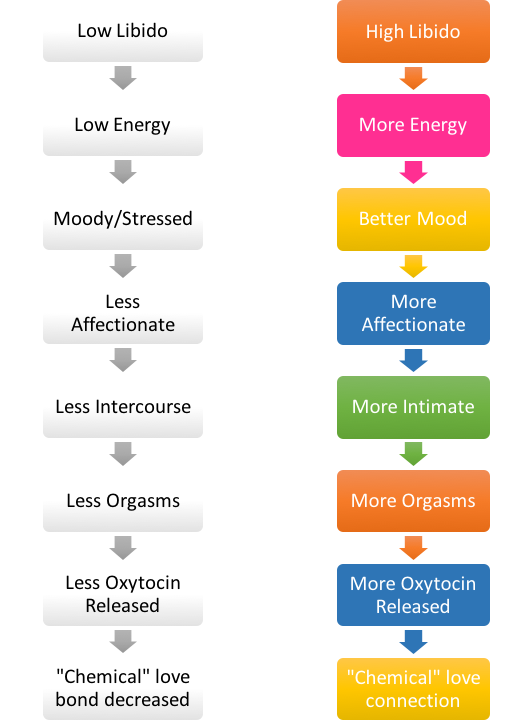Libido, or sexual desire, can be affected by multiple variables. If you have low libido, it can affect not only your sexual satisfaction and frequency of sex, but it may also have a substantial impact on your relationship satisfaction with your partner. Having healthy levels of libido leading to an active and satisfying sex life can contribute to more intimacy, better bonding with your partner, and a happier relationship. This article explores psychological, social, and physiological variables that may be causing you to have low libido and what you can do to restore normal levels of libido.
Low testosterone is frequently a cause of low libido. Testosterone plays a crucial role in regulating libido, as well as in erection. Studies have shown that testosterone replacement therapy on men with low testosterone has resulted in
significant increases in frequency of thoughts about sex and intensity of sexual feelings.1
Phoenix Men’s Health Center recommends a blood test to obtain an accurate measure of testosterone levels. One of our experienced physicians can discuss treatment options if your testosterone levels are low.
If you are depressed, one of the major symptoms can be lowered libido.2 Depressed people often feel the lack of motivation for everyday activities and loss of interest for activities that they found pleasurable before, including sex. The severity of depression is correlated with severity of the dysfunction and up to
75% of patients with depression may experience lowered libido.3
To make matters worse, certain antidepressants have sexual side effects and further impedes the ability to have a normal sex life.
In addition, fatigue, stress, and anxiety can also lead to loss of libido. Stress activates inhibitory pathways for arousal and desire and thus lower libido. Anxiety about performance in the bedroom or about the relationship affects libido and often occurs together with depression.
We also offer bio-identical testosterone therapy to safely and effectively restore your testosterone levels back to normal. Read more about bio-identical testosterone therapy here.
A few herbs have been found to be effective at increasing libido:
- Tribulus terrestris: Tribulus terrestris is a well-known aphrodisiac that has been shown to increase testosterone and dehydroepiandrosterone sulphate (DHEA) levels in animal and human studies.4, 5
- Yohimbe: Yohimbe has been used to treat erectile dysfunction and increase sexual performance for more than 7 decades. Yohimbe enhances release of nitric oxide, the crucial neurotransmitter that triggers erections.6
- Muira Puama: Also referred to as “potency wood,” extract from this Brazilian tree can enhance libido and increase frequency of sex.7
Please note that some can be dangerous to your heart and blood pressure, so be sure to consult your physician before taking these supplements. Also, be cautious of cheap over-the-counter and non-regulated products.
The following nutritional supplements have also been found helpful in treating libido problems:
- Zinc: Zinc plays an important role in male sexuality, especially on testosterone levels. For men with low testosterone levels, daily zinc supplementation can increase testosterone levels.
- Selenium: Selenium has been shown to improve libido and semen characteristics.8 Selenium is also essential in generating normal sperm.
- Good multivitamin: Supplementation with a good multivitamin, such as T1 or T2 (formulated exclusively to meet nutritional requirements of men and give natural testosterone boosts) can help increase libido and testosterone levels.
Getting quality sleep is also surprisingly an effective treatment for low libido. Men have natural testosterone rhythms during sleep (along with a 2-3 night erection cycle). Lower sleep efficiency and decreased Rapid Eye Movement sleep lowers testosterone.9 A few good night’s sleep helps to regenerate your testosterone levels naturally and increase libido.
Circling back to our initial title question, how can libido affect love? Although the relationship between love and libido is complex, one key component modulates this relationship. Oxytocin is a hormone secreted by the pituitary gland, also commonly known as the “love hormone.” Oxytocin is associated with female reproduction and maternal behavior, but is also released for both men and women when they reach the level of orgasm.10 Since
oxytocin facilitates bonding with your partner and feelings of love,
increased libido can lead to increased feelings of love.
Phoenix Men’s Health Center works everyday with men trying to get their normal libido and erections back to restore self-esteem, healthier and happier relationships, and more. Let us help you get there. Call (602-908-5422) or schedule an appointment today.
**Disclaimer: Charts have been formulated from physician’s personal observations
- Isidori, A., Giannetta, E., et al. (2005). Effects of testosterone on sexual function in men: Results of a meta‐analysis. Clinical endocrinology, 63(4), 381-394.
- Phillips Jr, R., & Slaughter, J. (2000). Depression and sexual desire. American Family Physician, 62(4), 782-786.
- Williams, K., & Reynolds, M. (2006). Sexual dysfunction in major depression. CNS spectrums, 11(S9), 19-23.
- Gauthaman, K., & Ganesan, A. (2008). The hormonal effects of Tribulus terrestris and its role in the management of male erectile dysfunction–an evaluation using primates, rabbit and rat. Phytomedicine, 15(1), 44-54.
- Brown, G., Vukovich, M., Martini, E., Kohut, M., Franke, W., Jackson, D., & King, D. (2001). Effects of androstenedione-herbal supplementation on serum sex hormone concentrations in 30-to 59-year-old men. International journal for vitamin and nutrition research, 71(5), 293-301.
- MacKay, D. (2004). Nutrients and botanicals for erectile dysfunction: examining the evidence. Alternative Medicine Review, 9(1), 4-16.
- Waynberg, J. (1995). Male sexual asthenia—interest in a traditional plant-derived medication. Ethnopharmacology,
Mar. - Marai, I., El-Darawany, A., Abou-Fandoud, E., & Abdel-Hafez, M. (2009). Reproductive and physiological traits of Egyptian Suffolk rams as affected by selenium dietary supplementation during the sub-tropical environment of Egypt. Livestock Research for Rural Development, 21(10).
- Schiavi, R., White, D., & Mandeli, J. (1992). Pituitary-gonadal function during sleep in healthy aging men. Psychoneuroendocrinology, 17(6), 599-609.
- Carmichael, M. , Humbert, R., Dixen, J., Palmisano, G., Greenleaf, W., & Davidson, J. (1987). Plasma oxytocin increases in the human sexual response. The Journal of Clinical Endocrinology & Metabolism, 64(1), 27-31.
**This content is for informational purposes only and is not intended as medical advice. Please consult with a healthcare professional before starting any treatment. Individual results may vary based on health conditions and other factors.



hello!,I love your writing so much! proportion we keep up a correspondence extra about your article on AOL? I need an expert in this space to solve my problem. May be that’s you! Having a look ahead to see you.
Thank you. Please call our office or go to our Genbook to book an appointment! Thank you.